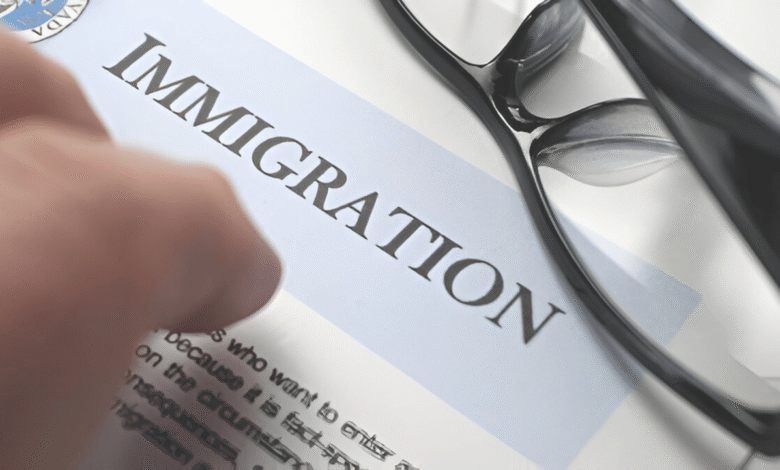Your 2025 Guide to Immigration Law in the United States
2025 US immigration law Your complete guide to visas, green cards, citizenship & policy changes. Expert insights for successful applications.

Navigating U.S. immigration law in 2025 requires a clear understanding of the latest policies, visa options, and legal pathways. With ongoing reforms under the Biden administration, key areas like work visas, green cards, asylum, and citizenship have seen significant updates. Whether you’re a skilled worker, a family member seeking reunification, or an asylum seeker, staying informed about these changes is crucial for a successful Immigration Law journey. This guide provides a detailed breakdown of the current system, helping you make informed decisions and avoid common pitfalls.
The U.S. Immigration Law continues to evolve, with new rules affecting processing times, eligibility, and enforcement. In 2025, priority is given to high-demand occupations, family-based sponsorships, and humanitarian protections, but backlogs and policy shifts can still create challenges. From H-1B visa reforms to updated naturalization requirements, this guide covers everything you need to know to navigate the process efficiently. By understanding the latest developments, you can better prepare your application and increase your chances of success.
Your 2025 Guide to Immigration Law in the United States
Understanding the U.S. Immigration Law in 2025
The U.S. Immigration Law is divided into family-based, employment-based, humanitarian, and diversity visas. Each category has specific eligibility requirements, quotas, and processing times. In 2025, the government continues to prioritize high-skilled workers, family reunification, and refugee resettlement. However, backlogs remain a significant issue, particularly for green card applicants from high-demand countries like India and China. Recent reforms aim to reduce wait times by increasing visa quotas and modernizing application systems. The USCIS (U.S. Citizenship and Immigration Services) has also expanded premium processing for certain petitions, allowing faster decisions for an additional fee.
H-1B, L-1, and Other Employment-Based Options
For professionals seeking employment in the U.S., the H-1B visa remains the most popular choice. In 2025, the lottery system has been updated to prioritize applicants with advanced degrees and specialized skills. Employers must still prove that the role requires a foreign worker and pay the prevailing wage to prevent exploitation. Other work visas include the L-1 visa for intracompany transfers, the O-1 visa for individuals with extraordinary abilities, and the TN visa for Canadian and Mexican professionals under USMCA (U.S.-Mexico-Canada Agreement). Each visa has unique requirements, and consulting an Immigration Law can help avoid costly mistakes.
Family-Based Immigration
Family reunification is a cornerstone of U.S. Immigration Law U.S. citizens and lawful permanent residents (LPRs) can sponsor certain relatives, but processing times vary. Immediate relatives (spouses, parents, and unmarried children under 21) of U.S. citizens face no annual caps, while other categories (like siblings and married children) have long waiting periods. In 2025, the Biden administration has proposed reducing family-based backlogs by recapturing unused visas from previous years. However, applicants should prepare for extended processing times and ensure all documentation is accurate to avoid delays.
EB Categories and Adjustment of Status
Employment-based (EB) green cards are divided into five preference categories, from EB-1 (priority workers) to EB-5 (investors). The EB-2 and EB-3 categories are common for professionals with advanced degrees or Skilled worker certifications. In 2025, STEM (Science, Technology, Engineering, and Mathematics) fields continue to receive priority. Applicants can adjust their status from within the U.S. if they meet eligibility criteria, while others must undergo consular processing at a U.S. embassy abroad. Recent updates allow certain applicants to file for adjustment of status even if a visa isn’t immediately available, reducing uncertainty.
Citizenship and Naturalization
Becoming a U.S. citizen through naturalization requires five years of permanent residency (or three years if married to a U.S. citizen), good moral character, and passing a civics and English test. In 2025, USCIS has introduced a more streamlined application process with online filing options and reduced fees for low-income applicants. The Biden administration has also expanded access to citizenship for military service members and simplified the process for certain DACA recipients. Preparing for the interview and test is critical, as denials can lead to lengthy reapplications.
Asylum and Refugee Policies in 2025
The U.S. continues to offer protection to those fleeing persecution, but asylum policies have tightened. Applicants must prove a well-founded fear of persecution based on race, religion, nationality, political opinion, or social group. In 2025, new rules aim to speed up asylum processing while restricting eligibility for those who pass through multiple countries before reaching the U.S. Refugee admissions have increased compared to previous years, with a focus on individuals from conflict zones like Ukraine, Afghanistan, and Venezuela. Working with an Immigration Law can strengthen an asylum case and prevent deportation.
Deportation Defense and Immigration Court
Facing removal proceedings is a daunting experience, but Immigration Law have legal rights. In 2025, ICE (Immigration and Customs Enforcement) has shifted focus toward individuals with serious criminal records, though enforcement policies vary by region. Options for relief include cancellation of removal, asylum, or appeals. Having strong legal representation is essential, as missing a court date can result in a deportation order.
How to Avoid Immigration Scams and Fraud
Recognize Common Scam Tactics
Beware of unsolicited calls demanding payment or threatening deportation – USCIS never operates this way. Scammers often forge government logos and use fake “expedited processing” offers to exploit desperate applicants. Notarios (non-attorneys) illegally offer legal services while lacking proper immigration law credentials.
Verify Official Communication Channels
Always check correspondence through your USCIS online account – never trust emails/texts with suspicious links.
Legitimate government notices will come on official letterhead with your exact case number. USCIS.gov is the ONLY valid website – watch for subtle misspellings in scam copycat sites.
Protect Your Personal Information
Never share A-numbers, passport details, or payment info with unverified callers/websites. Use secure payment methods (USCIS checks/money orders) rather than wire transfers or gift cards. Report suspicious requests to the FTC and USCIS antifraud unit immediately to protect others.
Work Only With Licensed Professionals
Verify attorneys through state bar associations and check their disciplinary history first. Accredited representatives must work for USCIS-recognized organizations ask for proof. Avoid “visa consultants” who can’t legally represent you in Immigration Law proceedings.
Read More: Facing Medical Billing Issues? Contact a Healthcare Lawyer Near You
Conclusion
As we navigate U.S. immigration law in 2025, it’s clear that staying informed and prepared is more important than ever. The system continues to evolve with policy reforms, updated visa categories, and shifting enforcement priorities. Whether you’re pursuing a work visa, family sponsorship, or citizenship, understanding these changes can mean the difference between approval and denial. By leveraging professional legal guidance and ensuring thorough documentation, applicants can overcome common challenges like processing delays and complex eligibility requirements.
While the path through U.S. immigration law may seem daunting, millions successfully achieve their goals each year. The key lies in patience, persistence, and a clear understanding of the latest regulations. As policies adapt to economic and humanitarian needs, opportunities remain for those who approach the process strategically. With the right preparation and resources, your American dream is still within reach stay informed, stay compliant, and move forward with confidence.
FAQs
What are the major changes to work visas in 2025?
The H-1B visa program now uses a merit-based selection process prioritizing higher wages and specialized skills, while new remote work policies affect L-1 visa holders.
How long does family-based green card processing take?
Immediate relatives of U.S. citizens typically wait 12-24 months, while other categories (like siblings) face 10+ year backlogs, especially for applicants from Mexico, India, and the Philippines.
Can DACA recipients apply for green cards in 2025?
Some may qualify through marriage or employer sponsorship, but there’s still no direct path – proposed legislation could change this later in 2025.
What’s new in the citizenship process?
USCIS has expanded online filing, added testing accommodations, and introduced a streamlined process for certain military spouses and veterans.
How has asylum processing changed?
New rules require applicants to seek protection in transit countries first, with faster decisions (often within months) but higher denial rates for border arrivals.












One Comment